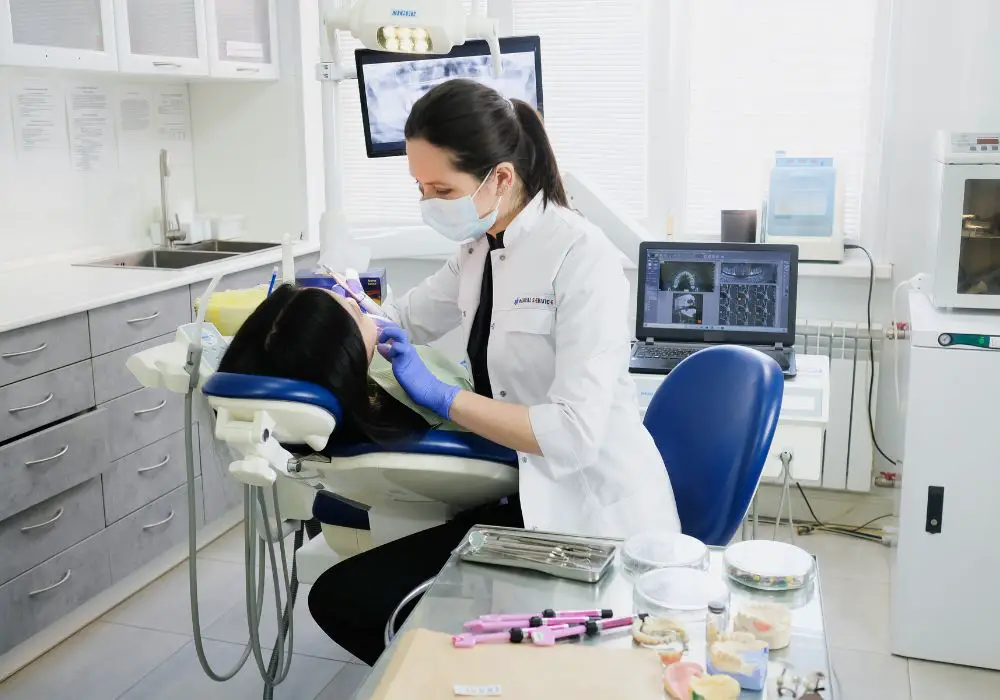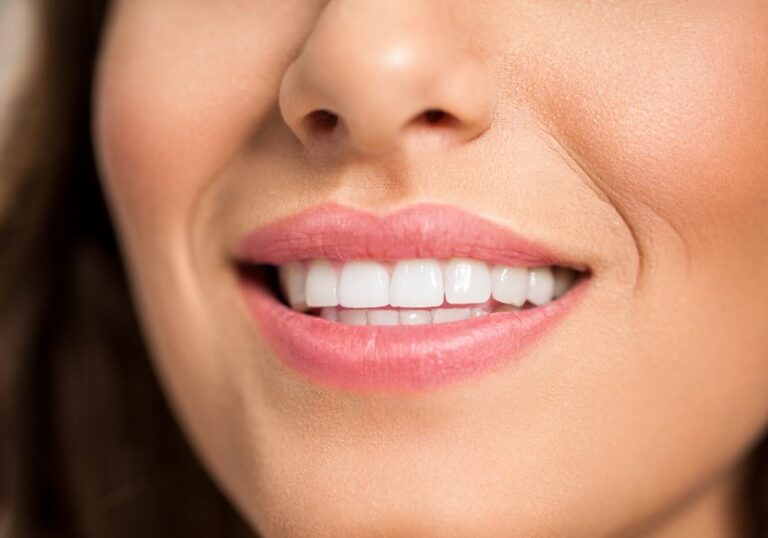Seeing black gunk on your teeth can be alarming. Also known as black plaque, this discoloration is quite common and has several potential causes. While in some cases it may simply be superficial stains, black gunk can also indicate more serious dental issues that need treatment.
Understanding the source of black gunk on your teeth is key to removing it and keeping it from returning. This article explores the various reasons you may find dark plaque on your teeth and what you can do about it.
Causes of Black Gunk on Teeth

There are a few likely culprits behind the buildup of black material on teeth:
Tobacco Use
Smoking cigarettes, cigars, pipes, chewing tobacco, dipping snuff and other tobacco products can stain teeth black over time. The tar and nicotine in tobacco smoke coats the teeth, leaving behind stubborn stains. Even using e-cigarettes can discolor teeth due to the chemicals involved.
Tobacco use causes black stains in two ways:
- External discoloration as the tar and nicotine particles stick to tooth enamel.
- Internal discoloration as the chemicals penetrate deeper into the teeth.
The longer you use tobacco and the more frequently you use it, the worse the black staining will become.
Food and Drink
Certain food and drinks can also stain your teeth black:
- Coffee
- Tea
- Red wine
- Colas
- Soy sauce
- Balsamic vinegar
- Blueberries
- Pomegranate juice
These contain chromogens – pigment molecules that cling to dental plaque and turn it dark brown or black. Chromogens are found in both artificially colored and naturally dark-colored foods and beverages.
Over time, drinking dark liquids and eating pigmented foods causes black gunk to build up if plaque is not removed properly. The stains can develop in as little as 24 hours.
Dental Plaque
Plaque that is not brushed and flossed away hardens into tartar over time. This tartar, also called calculus, provides a rough surface that stains and debris can adhere to.
As plaque minerals crystallize they can turn black. Older tartar tends to look darker and as it accumulates, the black gunk gets thicker.
Medications
Certain medications can have the side effect of blackening teeth. Some examples include:
- Iron supplements or multivitamins containing iron
- Bismuth-containing medications like Pepto-Bismol
- Anticoagulants
- Anti-malarials
The discoloration occurs as metabolites from these medications bind to plaque on the teeth. It can develop after just a few weeks of use.
Dental Restorations
Metal dental work like amalgam fillings, crowns, braces and implants can corrode over time. This causes a black line next to the gumline or grey/black staining of the adjacent teeth.
Other dental restorations like porcelain fillings and crowns can become discolored too. The cement attaching them also may turn black after years of service.
Poor Oral Hygiene
Failing to brush and floss properly allows more plaque to accumulate on teeth. This plaque reacts with mouth bacteria and food particles to form tartar, stains and eventually black gunk.
Those who do not regularly visit the dentist for professional cleanings tend to experience worse black plaque buildup over time. Insufficient oral hygiene provides the ideal environment for discoloration.
Tooth Decay
Cavities enable stains to penetrate deeper within the teeth, leading to black material inside the hollowed area. The decayed tooth structure changes color as the inner layers become irritated and small holes develop.
Untreated dental caries can burrow further into the tooth and cause a dark cavity underneath the enamel. The infected inner tooth tissue blackens from the decay.
Periodontal Disease
Advanced gum disease creates pockets around the base of the teeth that become filled with bacteria and debris. This gets packed in and turns blackish-green, known as black tartar.
Inflamed gums tend to recede as periodontitis worsens. This exposes stains under the gumline that were previously hidden.
Health Risks from Black Gunk

While black material on your teeth may seem like just an aesthetic concern, it can pose dangers for your oral and overall health.
Tooth Decay
Thick deposits provide hiding places for cavity-causing bacteria. The plaque also releases acids that eat away at enamel. This accelerates dental caries and decay.
Gum Disease
Plaque and tartar irritate the gums and promote inflammation and bacterial overgrowth. As they turn black, the festering periodontal pockets enable more serious infections.
Bad Breath
The anaerobic bacteria that thrive with substantial plaque growth produce foul-smelling gases and organic compounds. Black gunk on teeth is a major cause of bad breath (halitosis).
Heart Disease
Oral bacteria from gum infections can enter the bloodstream and contribute to arterial plaque buildup. This raises cardiovascular disease risks.
Respiratory Infections
Bacteria can also move from black dental plaque to the lungs. This leads to a higher chance of pneumonia, bronchitis and other respiratory infections.
Oral Cancer
Long-term tobacco use that stains teeth black is linked with increased oral cancer risks. The gums are especially susceptible to tumor development.
Removing Black Gunk from Teeth
Getting rid of unsightly black plaque and stains requires removing both surface and deeper discoloration. Here are some effective methods:
Professional Dental Cleaning
A regular cleaning by your dentist or hygienist is essential for removing tenacious plaque above and especially below the gumline. They will scrape and polish all tooth surfaces and use antibacterial rinses.
You may need more frequent dental cleanings if you have excessive buildup. Teeth with restorations like braces may require special tools.
White Strips and Whitening Trays
Over-the-counter whitening products with peroxide can bleach away external stains on enamel. They are less effective on larger dark tartar deposits. In-office power whitening works faster.
Ultrasonic Scaling and Laser
Your dentist can use ultrasonic scalers or laser devices to break up tartar and lift away pigmented plaque. This is sometimes needed before whitening if stains are deep.
Air Polishing
Pressurized air and baking soda crystals sprayed onto teeth can help dislodge black gunk and debris between teeth and around dental work. The GentleWave procedure also cleans beneath the gums.
Toothpastes and Mouthwashes
Some toothpastes contain mild abrasives and chemicals like hydrogen peroxide that scrub away surface stains. Rinsing daily with an antibacterial mouthwash reduces plaque.
However, these cannot remove thicker tartar. Look for whitening toothpastes with activated charcoal or calcium peroxide for best stain removal.
Diet and Habit Changes
Cutting down on staining foods/drinks and quitting tobacco can prevent more black gunk from accumulating. Drinking with a straw or swishing water after consuming chromogens also help.
Regular Brushing and Flossing
While essential, brushing and flossing alone are usually insufficient to fully clear black stained plaque on teeth. But combined with professional cleaning, they keep new discoloration from quickly returning.
Be sure to reach areas around and under dental work that can collect debris. Focus brushing where your teeth touch to combat interdental plaque.
When to See Your Dentist

Make a dental appointment right away if you notice:
- Sudden black stains appearing quickly
- Stains along with pain or sensitivity
- Stains around loose crowns or teeth
- Dark spots under old fillings
- Blackened plaque with swollen/bleeding gums
Seek prompt dental care to determine if any underlying problems need treatment besides cosmetic cleaning. Catching substantial tartar buildup early is key.
Can You Prevent Black Gunk on Teeth?
While difficult to prevent completely, you can reduce the chances of black gross stuff accumulating on your teeth by:
- Brushing twice and flossing once daily
- Having regular professional teeth cleanings every 6 months
- Using an antibacterial mouthwash daily
- Cutting down on staining food/drinks
- Quitting tobacco use if applicable
- Getting dental restorations adjusted timely if needed
- Treating any gum disease or cavities early
Promptly removing plaque each day before it hardens and turns black is crucial. This takes diligence but prevents tooth decay and expensive dental procedures down the road.
Frequently Asked Questions
Here are answers to some common questions about black gunk on teeth:
1. Is black stuff on my teeth from smoking permanent?
Black stains from cigarette smoking do not easily wipe away. The tar penetrates the enamel layers, so the discoloration can be quite stubborn without professional cleaning. However, it can be reversed over time with consistent teeth whitening and limiting further smoke exposure.
2. Can black plaque on teeth be removed at home?
Mild surface stains may lighten somewhat using over-the-counter whitening strips or special charcoal toothpaste. But removing thick, dark tartar requires a dentist using scalers, ultrasonic tools, air polishing, laser, and/or deep cleaning.
3. Why does my dental crown look black at the gumline?
Crowns can trap plaque around the edges next to your gums over time. As this plaque hardens into tartar, it can turn blackish-green. Your dentist will need to thoroughly clean around and under the crown to remove the gunk.
4. I brush my teeth twice a day but still get black gunk – what gives?
Brushing alone is often not enough, especially for stain-prone teeth. Be sure to floss daily as well to clear material between teeth. Also get on a 6-month professional cleaning schedule to remove tartar from all surfaces.
5. Is black stuff coming from my gums a sign of gum disease?
Yes, black tartar forming in periodontal pockets indicates advanced gum disease. The bacteria in plaque produce sulfur compounds during infection, turning subgingival tartar black. See your dentist to treat the periodontitis.
Conclusion
Black plaque buildup on teeth can look unsightly and signal dental health issues beyond simple stains. Knowing what causes black gunk and taking prompt action to remove it can help minimize tooth decay and gum disease risks. Schedule regular dental cleanings, adjust your home care routine, and get stains or decay treated early for your best smile.







